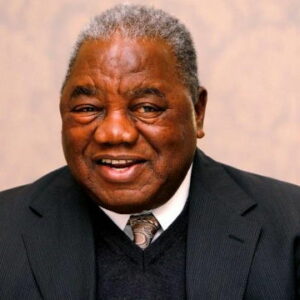Rupiah Banda is a Zambian politician who served as President from 2008 to 2011 before losing to opposition leader Michael Sata. Born in Zimbabwe to Zambian migrant parents, he grew interested in politics early in life and joined the Zambian African National Congress (ZANC), which was led by the late Harry Mwaanga Nkumbula. However, he quickly abandoned the party and joined Kenneth Kaunda’s United National Independence Party’s youth wing (UNIP). With time, he climbed to prominence in Zambian politics and became a powerful force. Prior to becoming president, he held various important diplomatic roles and served as Vice President during President Levy Mwanawasa’s administration. When incumbent President Mwanawasa suffered a stroke, Banda was forced to assume control of the presidency. Following Mwanawasa’s death, he served as acting president before being properly elected President of Zambia in 2008. He concentrated on Zambia’s economic development as president and was instrumental in increasing commerce with other countries. He was a successful businessman before entering politics, and his commercial expertise aided him in revitalizing Zambia’s trade and industry. He was, however, accused of corruption and abuse of power, and his presidential immunity was revoked as a result.
Childhood and Adolescence
Rupiah Banda was born on February 13, 1937, to Zambian migrant workers in the town of Miko, Gwanda, Southern Rhodesia (now Zimbabwe). Bwezani and Sarah Banda, his parents, had traveled to Zimbabwe in quest of work.
He spent his boyhood in Zimbabwe, where he was first sponsored by a local Dutch Reformed Church pastor and then by the family of B. R. Naik, who aided him financially and ensured that he received a proper education. Rupiah became interested in politics at a young age as a result of his contact with the Naiks, who were important political campaigners.
He completed his secondary education at Munali Secondary School, where he excelled academically. He joined the Zambian African National Congress (ZANC), which was led by the late Harry Mwaanga Nkumbula, while at Munali.
He was awarded a scholarship to study at Ethiopia’s University of Addis Ababa. He excelled academically here as well, receiving a scholarship from the International Union of Students to study Economic History at Sweden’s famed Lund University, where he got a Bachelor’s degree in 1964.
With time, his interest in politics grew, and he eventually got disillusioned with the ZANC’s moderate attitude, leaving to join Kenneth Kaunda’s United National Independence Party’s youth wing (UNIP). He acted as UNIP’s Representative to Northern Europe while in Sweden, helping to raise awareness about UNIP’s cause and securing scholarships for several Zambian students. After completing his degree in Sweden, he returned to Zambia and enrolled in a Diplomacy and International Relations programme at the National Institute for Public Affairs (NIPA).
Career of Rupiah Banda
Rupiah Banda began his diplomatic career as Egypt’s Ambassador, a position he held until 1967. For him, this position was extremely rewarding because he got significant expertise in diplomacy and conflict resolution. In April 1967, he was appointed Ambassador to the United States, a position he held for the next two years before returning to Zambia to take up the position of Chief Executive of the Rural Development Corporation.
In 1970, he began his commercial career as the General Manager of the National Agricultural Marketing Board (NAMBOARD), a precursor to today’s Food Reserve Agency. Until 1974, he was also the General Manager of the Rural Development Corporation. He contributed to the development of agriculture in the country throughout his time as General Manager.
In 1974, he was appointed Permanent Representative of Zambia to the United Nations in New York. He also served as Chairman of the UN Council for Namibia at this time. He was nominated to the Zambian Cabinet as Minister of Foreign Affairs after nearly a year at the United Nations (1975-76).
In 1978, Rupiah Banda was elected to the Munali Constituency as a UNIP Member of Parliament. Munali was the country’s largest constituency at the time, consisting of what are now the Munali and Lusaka Central seats combined.
President Mwanawasa was re-elected in 2006, and in October 2006, he selected Banda as Vice-President, along with a new cabinet. He was given the task of strengthening relations with neighboring Zimbabwe as Vice-President.
In June 2008, President Mwanawasa suffered a stroke, and Banda took over as acting President. Mwanawasa never recovered from his stroke and died in hospital in Paris in August 2008, while Banda narrowly won the presidential election in October 2008. In September 2011, he stood down as president after Michael Sata, the leader of the opposition Patriotic Front, beat him in the presidential election.
Major Projects of Rupiah Banda
Rupiah Banda prioritized Zambia’s economic development as president. He made efforts to increase Zambian trade with other countries to this purpose.
Personal History and Legacy
In 1966, Rupiah Banda married Hope Mwansa Makulu, with whom he had three kids. Hope died of breast cancer in 2000, and he was heartbroken over his loving wife’s death. Thandiwe, a political science instructor more than 30 years his junior, was the next person he encountered. Despite their large age gap, the pair continued their connection and eventually married. His fraternal twins were born to his second marriage. In addition to the children from his two marriages, he has two sons from earlier relationships.
Estimated Net Worth
Rupiah is one of the world’s wealthiest currencies and one of the most popular. Rupiah Banda’s net worth is estimated to be $1.5 million, according to Wikipedia, Forbes, and Business Insider.


